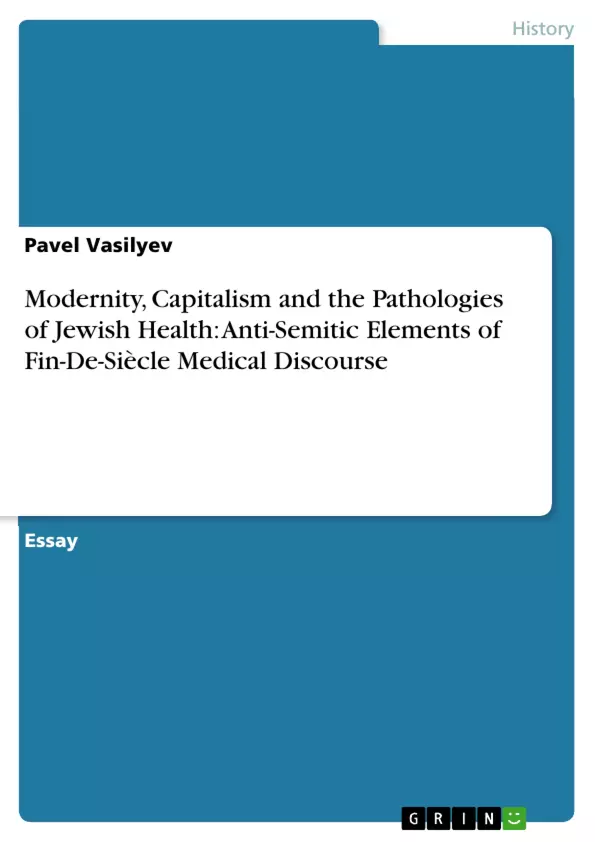While we are generally eager to recognize the importance of medicine and medical discourse in the contemporary world, it is not always easy to connect the history of medicine with the study of anti-Semitism. Indeed, this topic has received relatively little attention from scholars. However, I will argue that a closer look at the anti-Semitic elements of medical discourse is an important and promising enterprise. If we examine the most notorious manifestation of modern anti-Semitism, the Shoah, we can easily see that it was at least partially prepared and justified by the authority of medical science. In contemporary post-modern world, academics and laymen alike often question the objectivity of science and its ability to coherently explain the world, but for the late 19th and early 20th century Europeans Science was perhaps the highest authority and the main reference point. Accordingly, when the genocide of the Jews was justified scientifically, it became much more difficult to resist it. The focus of this paper is on the same region where the Nazi genocide was planned and carried out (Central Europe) and on the German-language medical discourse (German being arguably the most important language for European scientific discourse for a long period). However, I will concentrate on the period that preceded the Nazi rule (late 19th and early 20th centuries) – and for some reasons. As scholars struggle to comprehend the horrific design of the Holocaust, they come to the understanding that it is impossible to explain the Nazi genocide without looking at the rise and developments of modern anti-Semitism in Wilhelmine Germany (even though it is absolutely necessary to differentiate between the two). This approach was implemented by Shulamit Volkov in her attempt to distinguish “the written matter” and “the spoken word” as well as by some medical history scholars dealing with continuity/discontinuity debate.
Accordingly, in this paper I will look at fin-de-siècle German-language medical discourse to locate and analyze anti-Semitic sentiments and critique of Jewish health that were often inherent in it. In particular, I am interested why (and how) various alleged pathologies of Jewish health were associated with modernity and capitalist economy. Additionally, I want to trace the influence that fin-de-siècle medical anti-Semitism had in the later period.
Inhaltsverzeichnis (Table of Contents)
- Scientification of Stereotypes: The Nature and Content of Anti-Semitic Medical Discourse
- The Lines of Reasoning: Anti-Modernism and Anti-Semitism
- Solutions of the Problem: Possible Responses to Medical Anti-Semitism
Zielsetzung und Themenschwerpunkte (Objectives and Key Themes)
This paper investigates the presence of anti-Semitic elements within the medical discourse of fin-de-siècle Central Europe, specifically focusing on the German language. It aims to analyze how alleged pathologies of Jewish health were associated with modernity and capitalism, and to trace the influence of this medical anti-Semitism on later periods. The paper draws upon key medical history works such as Sander Gilman's "The Jew's Body" and John Efron's "Medicine and the German Jews."
- The "scientification" of existing anti-Semitic stereotypes within medical discourse.
- The association of Jewish health with modernity, particularly its perceived negative aspects like capitalism, cosmopolitanism, and urbanization.
- The paradoxical portrayal of Jews as both overly modern and backward.
- The persistence of medieval anti-Semitic stereotypes in the medical discourse of the late 19th and early 20th centuries.
- The impact of medical anti-Semitism on later periods.
Zusammenfassung der Kapitel (Chapter Summaries)
- Scientification of Stereotypes: The Nature and Content of Anti-Semitic Medical Discourse: This chapter examines the nature and content of anti-Semitic medical discourse in fin-de-siècle Europe. It explores the seeming contradiction between the prevalence of anti-Jewish sentiment among doctors and the over-representation of Jews in the medical profession. The chapter analyzes how existing stereotypes about Jewish people were "scientified" using medical language, perpetuating negative perceptions.
- The Lines of Reasoning: Anti-Modernism and Anti-Semitism: This chapter delves into the reasons behind the alleged pathologies of Jewish health, arguing that they were often linked to anxieties surrounding modernity and its perceived negative consequences. It discusses how the Jews' association with capitalism, cosmopolitanism, and urbanization contributed to these accusations. It also explores the role of traditional anti-Semitic views in perpetuating these negative perceptions.
Schlüsselwörter (Keywords)
This paper explores key themes of anti-Semitism, medical discourse, modernity, capitalism, Jewish health, stereotypes, fin-de-siècle Europe, and the German language. The study draws upon works by scholars such as Klaus Hödl, Sander Gilman, and John Efron, examining the "scientification" of anti-Semitic stereotypes and the role of modernity in shaping perceptions of Jewish health. The paper analyzes the prevalence of anti-Semitic elements within medical discourse and their implications for the later period.
Frequently Asked Questions
How was anti-Semitism linked to medical discourse in the fin-de-siècle?
Medical discourse in late 19th-century Central Europe "scientified" existing stereotypes, using medical language to portray Jews as having specific "pathologies" or being biological outsiders.
Why were Jews associated with the "pathologies of modernity"?
Anti-Semitic doctors linked Jews to the perceived negative effects of capitalism, urbanization, and cosmopolitanism, claiming these modern lifestyles caused unique nervous or physical illnesses in Jewish populations.
What is the "scientification of stereotypes"?
It is the process where traditional religious or social prejudices against Jews were reframed as objective scientific or medical facts to give them higher authority.
How did this discourse influence the Shoah (Holocaust)?
The paper argues that the Nazi genocide was partially prepared and justified by the scientific authority of this earlier medical anti-Semitism, making resistance more difficult when it was presented as "science."
Which scholars' works are analyzed in this paper?
The paper draws on key works by Sander Gilman ("The Jew's Body"), John Efron, and Shulamit Volkov to analyze the continuity of anti-Semitic sentiments.
- Quote paper
- Pavel Vasilyev (Author), 2010, Modernity, Capitalism and the Pathologies of Jewish Health: Anti-Semitic Elements of Fin-De-Siècle Medical Discourse, Munich, GRIN Verlag, https://www.grin.com/document/163782



